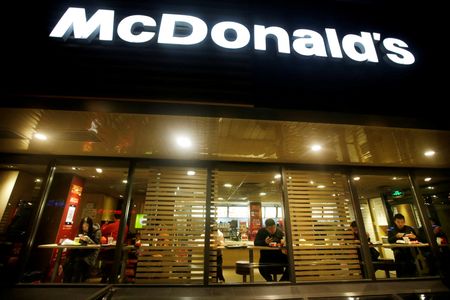 1
1 1
1
By Hilary Russ and Deborah Mary Sophia
(Reuters) -McDonald’s Corp beat Wall Street expectations for quarterly global comparable sales and profit on Tuesday, as more customers visited in every market and from all income groups amid the threat of a recession.
Also helped by higher prices for burgers and fries, global comparable sales climbed 12.6%, blasting past analysts’ estimates of an 8.5% rise, according to Refinitiv IBES data.
Sales also jumped by 12.6% within each of McDonald’s geographical segments – including Europe, where inflation is more severe than the United States.
The Chicago-based company is gaining market share “across all income groups, which makes us feel good about kind of where we’re at from a value and a consistency standpoint,” Chief Executive Chris Kempczinski said during an earnings call.
Though customers are buying fewer items per order, McDonald’s performs well “in good times and in bad,” Kempczinski said. “That’s what gives us the optimism as we go through the rest of this year.”
The burger chain’s shares fell about 1% in choppy trading as the market was broadly lower. McDonald’s maintained its 2023 outlook as it kicked off quarterly earnings reports among publicly traded restaurants.
“Investors are struggling to balance the good news … versus the reality that global economies could slow while inflation persists,” Northcoast Research analyst Jim Sanderson said.
Gaining share among all income groups “is emblematic of the strength that the brand is seeing broadly across the U.S. and globally,” UBS analyst Dennis Geiger said, adding that McDonald’s attracting more middle- and higher-income consumers also highlights the company’s moves to improve speed of service and food quality, among other enhancements.
While McDonald’s has raised menu prices in the low double digits since last year to shield margins as costs rose, its meals have remained less expensive than its competitors’.
The average spending per McDonald’s trip was $7.77 for the 12 months ended March 31, less than its closest burger rivals Burger King and Wendy’s and most other fast-food brands, according to data firm Numerator.
However, growth in McDonald’s delivery has slowed, Kempczinski said.
In Germany, McDonald’s sales were helped by its launch of “McSmart” bundles – two sandwiches, fries and a drink for 5.99 euros ($6.58) – that provided “smaller, more affordable meals to our consumers,” Chief Financial Officer Ian Borden said on the call.
McDonald’s in Europe is larger than its next nine closest competitors combined, which should also help it gain more market share through affordable food, marketing and renovated restaurants, according to TD Cowen analyst Andrew Charles.
McDonald’s did not say by how much visits had increased. But data from Placer.ai shows that traffic at the chain’s U.S. restaurants grew throughout the first 14 weeks of the year, outpacing the broader fast-food category.
The company has also doubled down on meal deals and promotions, including celebrity tie-ups with rappers Cardi B and Offset.
The company’s total revenue increased 4% from the prior year to nearly $5.9 billion in the three months ended March 31. That bested estimates of a 1.4% drop year-over-year to $5.587 billion.
On an adjusted basis, McDonald’s earned $2.63 per share, compared with estimates of $2.33. The company’s total restaurant margins in the U.S. rose 14% in the quarter.
McDonald’s is restructuring its corporate operations, including laying off hundreds of U.S. employees and closing offices.
It incurred $180 million of pretax restructuring charges to cover employee termination benefits, terminated contracts, including leases; professional services and other costs, according to the earnings release.
($1 = 0.9103 euro)
(Reporting by Deborah Sophia in Bengaluru and Hilary Russ in New York; Editing by Lincoln Feast, Shounak Dasgupta and Jonathan Oatis)